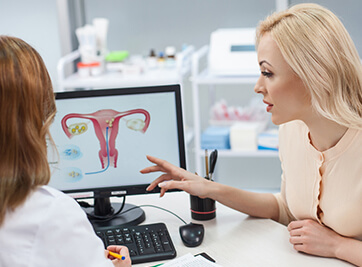
Polycystic Ovarian Syndrome
PCOS Treatments: A Doctor Outlines All Possible Options
Oct 2, 2017This young girl was only 13 when she came to me complaining of irregular periods. It was distressing for me to tell her that she may develop fertility problems in the future. The look on her mother’s face was uncomfortable when I told her that she was suffering from a dreaded hormonal condition: Polycystic Ovarian Syndrome (PCOS.) I told the young girl that for treating PCOS she would have to exercise regularly, follow a healthy diet and lose at least 5 kilograms of her body weight. Losing weight is a starting point for most women who need freedom from pcos treatment
The truth about PCOS treatment is that the condition can be managed or treated, but does not have a permanent cure. In other words, if you go back to the lifestyle that caused it in the first place, it can come right back. Also, Polycystic ovary syndrome is a complex condition. Each woman has her own PCOS symptoms and root causes.
However, there are a few things that may help in reversing the condition or getting it under control. Reversing PCOS lowers your risks of infertility, miscarriages, diabetes, heart disease, and uterine cancer. PCOS treatment will depend on your symptoms and whether you are planning to get pregnant.
Common Medications Prescribed As PCOS Treatment
A number of medications are prescribed by mainstream doctors to treat the different symptoms associated with Polycystic ovary syndrome.
Absent or Irregular periods
For regulation of menstrual cycle, doctors prescribe either a) Combination birth control pills or b) Progestin (hormonal) therapy.
Combination Birth Control Pills
Birth control pills that contain estrogen and progesterone decrease the production of androgens or male hormones, which are in excess in PCOS patients. These pills can also regulate your hormones. Some doctors may prescribe a skin patch or a vaginal ring containing both these hormones, instead of pills. These pills can also reduce the risk of developing endometrial cancer (cancer of the womb lining) in the long-run. This type of cancer is associated with irregular periods. However, you also need to note that these pills come with long- and short-term side effects.
Progestin therapy
A 10- to 14-day course of Progestin every one to two months can regulate your periods. It can also protect you from endometrial cancer.
Fertility problems
Clomiphene is one of the first medications recommended for PCOS patients who are trying to get pregnant. Clomiphene encourages the monthly release of an egg from the ovaries (causes ovulation). If Clomiphene is not successful in aiding ovulation, another medication called Metformin may be recommended. Metformin is usually used to treat type 2 diabetes, but it can also lower insulin and blood sugar levels in women with PCOS. Metformin can also help in regulating monthly periods in some women and lower the risk of a miscarriage. The long-term health benefits of Metformin on heart disease and cholesterol levels as well as its side effects are well known.
Letrozole and Tamoxifen are also prescribed for PCOS treatment instead of clomiphene to stimulate ovulation. These medications are used for treating breast cancer. The use of letrozole for fertility treatment is not licensed. Doctors who prescribe this drug for fertility, however, believe that the benefit of this drug is more than the associated risks.
Gonadotrophins may be given by injection if you’re unable to get pregnant despite taking oral medications. They are associated with the risk of overstimulation of ovaries leading to multiple pregnancies.
Excessive Hair growth (Hirsutism)
To reduce excessive hair growth, your doctor might recommend any of the following treatments.
- Birth control pills
- Cyproterone acetate
- Spironolactone (Aldactone)
- Flutamide
- Finasteride
These medications work by suppressing the production or blocking the effects of male hormones (androgens), thereby controlling excessive hair growth.
Doctors may also prescribe a cream called eflornithine to slow down the growth of unwanted facial hair. Improvement is seen after four to eight weeks.
Other options to remove excessive hair are physical methods such as plucking, shaving, threading or laser removal.
Other symptoms
If you are overweight, doctors may prescribe Orlistat as a weight-loss medication for PCOS treatment.
For the treatment of acne, doctors may prescribe Retinoids, if the grade of acne is severe.
Surgery
Doctors may recommend surgery for PCOS treatment in some women. Laproscopic ovarian drilling is a procedure in which your doctor punctures your ovary with a small needle that carries an electric current. This is done in order to destroy the part of the ovary that’s producing excess male hormones. It’s a short-term solution that can promote ovulation and reduce male hormone levels. However, drilling of ovaries is a procedure that is fast falling out of favour with doctors worldwide.
Natural Approaches To PCOS Treatment
The natural method of PCOS treatment involves changes to lifestyle and eating a healthy diet. Dietary supplements can also help in providing adequate nutrients to fight Polycystic ovary syndrome. Important lifestyle changes that are needed for the treatment of PCOS include:
Exercise Regularly To Lose Weight
If you have Polycystic ovarian syndrome, the first thing your doctor will suggest is to lose weight. Studies suggest that even a modest, five percent reduction in body weight may help improve your condition substantially. Exercise is important in PCOS treatment because it improves insulin sensitivity.
One of the best forms of exercise for PCOS is ‘strength training,’ because it can rebuild lost muscle tissue. The more muscle you have, the more calories you will burn per day. Regular exercise has incredible benefits that go way beyond weight loss for PCOS patients. However, if you’re a beginner, avoid intensive workouts, as too much exercise can overload the adrenal glands. This may increase inflammation and worsen your PCOS further. You can also try brisk walks, gentle weight lifting, dancing, aerobics or yoga. The optimal amount of exercise to aim for, as per studies is 45 minutes per day, at least 3 days each week.
Go For A PCOS-Friendly Diet
In order to lose weight, people go on crash diets which actually leads to muscle loss instead of fat loss. The more muscle tissue you lose, the more insulin resistant you get. And when the body gets insulin resistant, you start putting on weight, develop pigmentation, and break out, etc. So, if you want to lose weight, “LOSE FAT, GAIN MUSCLE”.
One of the reasons behind the rise of Polycystic ovary syndrome is we’ve stopped eating our traditional and nutritious foods. And we have replaced them with unhealthy, processed foods. A low-carb high fat diet has worked for many people with Polycystic ovary syndrome. Eating equal amounts of protein and carbohydrates helps in keeping your insulin levels even. This also maintains a healthy balance of hormones. The type of carbohydrates that you eat is also important. Try to consume only wholegrain or sprouted grain products. They contain more protein and fiber than their processed equivalents. Fiber is another important element of diet in PCOS treatment. It slows the digestion of sugars within the body. Eat small, healthy mini-meals throughout the day to manage cravings and hunger pangs.
Quit Smoking
If you smoke, consider quitting. Women who smoke have higher levels of androgens than women who don’t smoke. And as you know, this is a big no for polycystic ovarian syndrome.
Try Dietary Supplements
Some supplements that may benefit women with PCOS are:
Chiro Inositol and Myo Inositol
These are sugar-like compounds extracted from plant alcohols. In several studies conducted on women with insulin resistance and PCOS, inositol was found to produce remarkable improvements in patient symptoms and in lab parameters. A ratio of 40:1 is preferred between Myo Inositol and Chiro Inositol in studies.
Vitamin D and Calcium
In a study, the addition of 1000 mg of calcium a day and 100,000 IU of Vitamin D a month to daily Metformin treatment showed an improvement in PCOS symptoms over six months. This was a pilot study done in 100 women with PCOS.
Magnesium
Magnesium has no direct benefits in regulating periods in PCOS. It is, however, believed to show improvement in blood glucose and insulin levels. 300 mg of magnesium is recommended at bedtime in consultation with your doctor.
Chromium
Just like magnesium, chromium supplements significantly reduce blood sugar and insulin levels. A daily dose of 200 mcg of chromium picolinate may be helpful.
Omega-3 Supplements
Some research indicates that Omega-3 supplements can decrease androgen levels in women with PCOS.
Herbal supplements
Herbal supplements that work to lower blood sugar or balance hormones better are found in Ayurveda and other herbal traditions. As long as you work with a qualified practitioner and make the necessary diet and lifestyle changes, many of these herbal combinations can help in PCOS treatment.
Final Thoughts
A lot of people believe that they can learn how to heal their bodies and balance their hormones through natural methods without the supervision of experts. However, I would advise you to exercise caution. There is no doubt that you have a crucial role to play in recovering from PCOS – to make lifestyle changes, like eliminating processed foods and exercising regularly. However, it is also advisable to work with licensed and qualified practitioners while taking on a complex problem like PCOS. Never discontinue any medications on your own or add any new ones without the right professional advice.
If you are opting for a holistic and natural PCOS treatment, make sure it is prescribed by an experienced qualified practitioner. Whether it is diet, exercise, supplements or medications, make sure you consult a PCOS specialist before opting for a PCOS treatment plan.
References:
- A. D. Genazzani, C. Lanzoni, F. Ricchieri, and V. M. Jasonni, “Myo-inositol administration positively affects hyperinsulinemia and hormonal parameters in overweight patients with polycystic ovary syndrome,” Gynecological Endocrinology, vol. 24, no. 3, pp. 139–144, 2008. View at Publisher · View at Google Scholar · View at Scopus
- D. Costantino, G. Minozzi, F. Minozzi, and C. Guaraldi, “Metabolic and hormonal effects of myo-inositol in women with polycystic ovary syndrome: a double-blind trial,” European Review for Medical and Pharmacological Sciences, vol. 13, no. 2, pp. 105–110, 2009. View at Google Scholar · View at Scopus
- S. Gerli, M. Mignosa, and G. C. Di Renzo, “Effects of inositol on ovarian function and metabolic factors in women with PCOS: a randomized double blind placebo-controlled trial,” European Review for Medical and Pharmacological Sciences, vol. 7, no. 6, pp. 151–159, 2003. View at Google Scholar · View at Scopus






